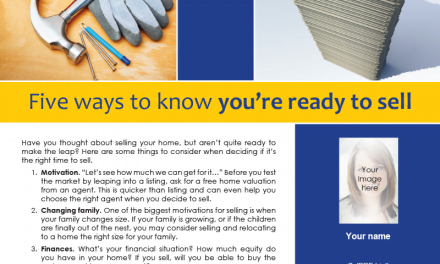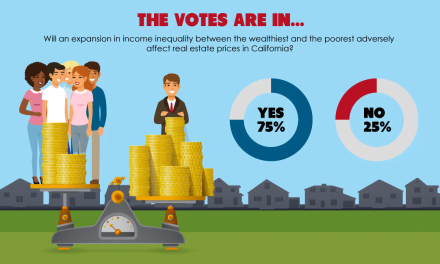The Federal Reserve Bank of New York (FRBNY) analyzed three cost factors homeowners consider when selling their homes:
- negative equity;
- rising interest rates; and
- property taxes.
All three factors reduce a homeowner’s ability to make a move. According to the Fed’s latest research, negative equity reduces mobility by 30%. By comparison, every $1,000 of additional borrowing costs or property taxes reduces mobility by 10%-16%.
The widespread restriction of homeowner mobility contributes to stagnation in the housing market. Though underwater homeowners hold title to a property, economically, they are merely tenants. They neither enjoy the positive attributes of true homeownership nor convey the benefits of ownership on the community with involvement, a sense of neighborhood pride or an increased standard of living.
firsttuesday insight
Surprise: negative equity is locking-in California residents. Most have lost hope and resigned themselves to their fate. Faceless bankers count on the widespread belief that there is no choice but to stay and pay. However, the minority of well- informed homeowners who can mentally learn to stomach a credit hit have the options of a short sale or a strategic default to right their financial ships.
Related Article:
Migratory lockdown: underwater homeowners confined
Related Article:
Will foreclosed homeowners and short sellers return to homeownership?
Homeowners who are underwater and unable to pay do qualify for a short sale discount from their lender. Further, if their short sale closes in 2013, they avoid adverse tax consequences.
Related article:
January sizzling copy! 2013 tax landscape: a boon to California real estate?
The problem arises for those who have the ability to continue payments. They are the ones who are truly locked into their homes. Their only option for exit is an intentional choice to cease mortgage payments, the aforementioned strategic default. This is not a “take or leave it” decision, but an option built into every trust deed mortgage on every home.
According to the foreclosure agency, You Walk Away, LLC, an intentionally foreclosed homeowner is out of the market for 5-7 years. Compare this to the 7-12 years it will take homeowners to replace the nominal dollar equity they lost during the housing crash, if the market is obliging (and there is no guarantee it will be). Meanwhile, purchasing power, favorable interest rates, and annual returns are all lost. It’s not a good bet to stay put.
Strategic default is a favorable financial decision for anyone that has no need for new sources of financing. Those who possess a credit card or two and updated transportation have all to gain in the strategic default choice. Businesswise, they will be cleaning up their balance sheets and righting their finances, not destroying them.
Better yet for the family and the local economy, a strategic default releases the chains of immobility imposed by negative equity. The freed homeowner is now able to rent a comparable or better home, find more advantageous and optimal employment, move anywhere. They can once again seek purchase-assist financing since their credit score recovers incrementally as they continue paying all other debts.
Further, mortgage lenders will soon see the need to make more loans. They will relax the restrictions before long, as happens during a recovery. And the herd of speculators needing to sell will make lease-options and land sales contracts a big deal.
We are in a historic era of the lowest actual and real mortgage rates ever. The result: a historic and remarkable buyer purchasing power. Fortuitously, prices of home are simultaneously at mean price levels. As we move forward a year or two, all this will change. Homeowners looking to sell will be the most affected. Interest rates on mortgages will rise. In turn, buyer purchasing power will dip, adversely affecting seller pricing, not buyers.
Homeowners who attempt to pay their way out of negative will waste thousands of dollars in family income. In time, they will realize the most favorable seller’s market is gone. 2016 will likely be the year of atonement for homeowners, a year when mortgage defaults will increase for those who unwisely chose to stay and pay.
Agent advice
Homeownership isn’t just a label. The American Dream of homeownership is based on storing wealth when the home is purchased, then benefiting from a build-up of equity. Spending years sinking money into a black-hole asset is certainly not part of what is left of that American Dream. Advise your negative equity clients of their options. Make sure they realize there is no moral or legal obligation to stay put. There is, however a family obligation to improve household conditions. A home is an asset owned, and asset management is strictly business.
Related Article:
RE: “Housing Busts and Household Mobility: An Update” from the Federal Reserve Bank of New York














